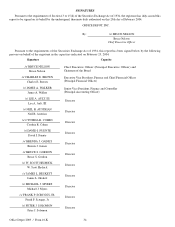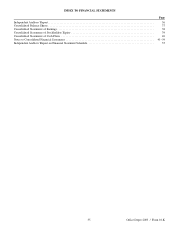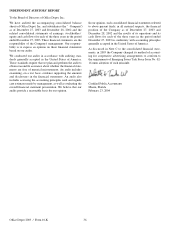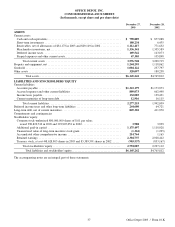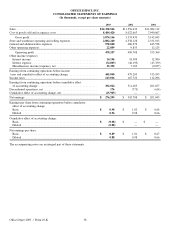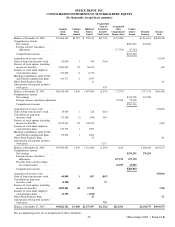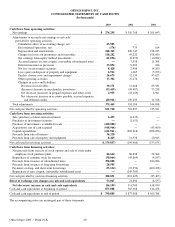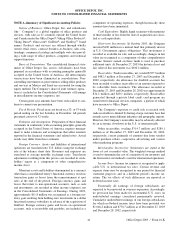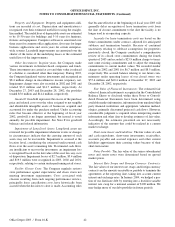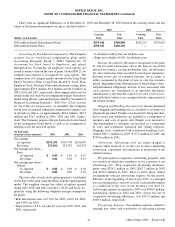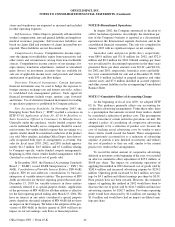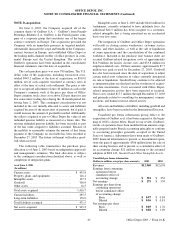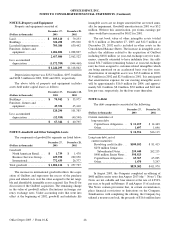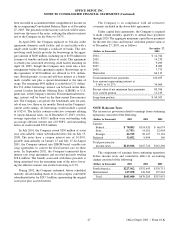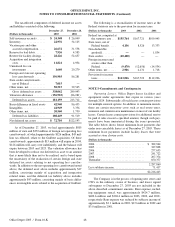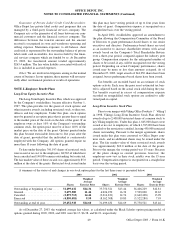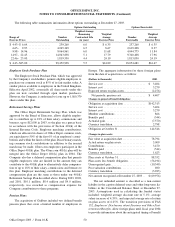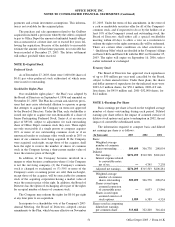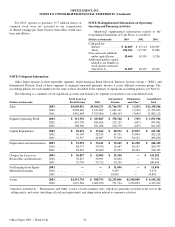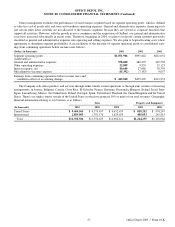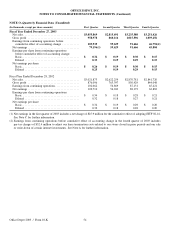Office Depot 2003 Annual Report Download - page 46
Download and view the complete annual report
Please find page 46 of the 2003 Office Depot annual report below. You can navigate through the pages in the report by either clicking on the pages listed below, or by using the keyword search tool below to find specific information within the annual report.stores and warehouses are expensed as incurred and included
in other operating expenses.
Self-Insurance: Office Depot is primarily self-insured for
workers’compensation, auto and general liability and employee
medical insurance programs. Self-insurance liabilities are
based on claims filed and estimates of claims incurred but not
reported. These liabilities are not discounted.
Comprehensive Income: Comprehensive income repre-
sents the change in stockholders’equity from transactions and
other events and circumstances arising from non-stockholder
sources. Comprehensive income consists of net earnings, for-
eign currency translation adjustments, realized or unrealized
gains (losses) on investment securities that are available for
sale, net of applicable income taxes, and proceeds and related
amortization of qualifying cash flow hedges.
Derivative Financial Instruments: Certain derivative
financial instruments may be used to hedge the exposure to
foreign currency exchange rate and interest rate risks, subject
to established risk management policies. Such approved
financial instruments include swaps, options, caps, forwards
and futures. Use of derivative financial instruments for trading
or speculative purposes is prohibited by Company policies.
New Accounting Standards: In November 2003, the
Emerging Issues Task Force (“ EITF”) reached a consensus on
EITF 03-10, Application of Issue No. 02-16 by Resellers to
Sales Incentives Offered to Consumers by Manufacturers.
Generally under this guidance, vendor funded coupons that
can be redeemed broadly across companies should be consid-
ered revenue, but vendor funded coupons that are unique to a
specific retailer should be considered a reduction of the product
cost sold. Most retailers, including Office Depot, have histori-
cally recognized both types of arrangements as revenue. Our
sales for fiscal years 2003, 2002, and 2001 include approxi-
mately $12.3 million, $4.5 million, and $7.6 million relating
to Company-specific vendor funded coupon arrangements.
Beginning in 2004, future vendor funded arrangements will be
classified as a reduction of cost of goods sold.
In December 2003, the Financial Accounting Standards
Board (“ FASB”) issued FASB Interpretation (“ FIN”) No.
46(R), Consolidation of Variable Interest Entities. FIN 46(R)
replaces FIN 46 and addresses consolidation by business
enterprises of variable interest entities. The provisions of FIN
46(R) are effective for the first reporting period that ends after
December 15, 2003 for variable interests in those entities
commonly referred to as special-purpose entities. Application
of the provisions of FIN 46(R) for all other entities is effective
for the first reporting period ending after March 15, 2004. We
have no interest in any entity considered a special purpose
entity; therefore, the initial adoption of FIN 46(R) did not have
an impact on the Company. We believe the adoption of the pro-
visions of FIN 46(R) in the first quarter of 2004 will have no
impact on our net earnings, cash flows or financial position.
NOTE B—Discontinued Operations
In August 2002, the Company announced its decision to
sell its Australian operations. Accordingly, the Australian por-
tion of the Company’s business is reported as a discontinued
operation in the International segment disclosure and in the
consolidated financial statements. The sale was completed in
January 2003 with no significant impact on net earnings.
Australia’s sales and pre-tax profit (loss), respectively,
were $80.9 million and $(1.0) million for 2002; and $72.0
million and $0.2 million for 2001. Diluted earnings per share
was not affected by discontinued operations in the three years
presented. Basic per share amounts were $(0.01) and $(0.01),
for 2002 and 2001, respectively. Australia’s assets and liabili-
ties were considered held for sale and at December 28, 2002,
with $33.0 million included in prepaid expenses and other
current assets and $7.0 million included in accrued expenses
and other current liabilities in the accompanying Consolidated
Balance Sheet.
NOTE C—Cumulative Effect of Accounting Change
At the beginning of fiscal year 2003, we adopted EITF
02-16. This guidance primarily affects our accounting for
cooperative advertising arrangements. Under these rules, there
is a presumption that amounts received from vendors should
be considered a reduction of product costs. This presumption
can be overcome if certain restrictive provisions are met. We
adopted a policy of considering all cooperative advertising
arrangements to be a reduction of product cost, because the
cost of tracking actual advertising costs by vendor to meet
these criteria would exceed the benefit. These arrangements
were previously accounted for as a reduction of advertising
expense. A portion is now deferred in inventory and reduces
the cost of products as they are sold, similar to the current
practice for vendor rebate arrangements.
To record the initial amount of cooperative advertising
deferred in inventory at the beginning of the year, we recorded
an after-tax cumulative effect adjustment of $25.9 million, or
$0.08 per share. The impact on continuing operations of
applying this method in 2003 decreased cost of goods sold by
$240.4 million and increased advertising expense by $234.2
million. Operating profit increased by $6.2 million, net earn-
ings by $4.3 million and diluted earnings per share by $0.01.
Prior periods have not been restated. However, the estimated
impact of applying this method in 2002 would have been to
decrease the cost of goods sold by $241.3 million and increase
advertising expense by $242.7 million. Pro forma operating
profit would have decreased by $1.4 million, net earnings by
$1.0 million and would have had no impact on diluted earn-
ings per share.
OFFICE DEPOT, INC.
NOTES TO CONSOLIDATED FINANCIAL STATEMENTS (Continued)
Office Depot 2003 / Form 10-K 44


